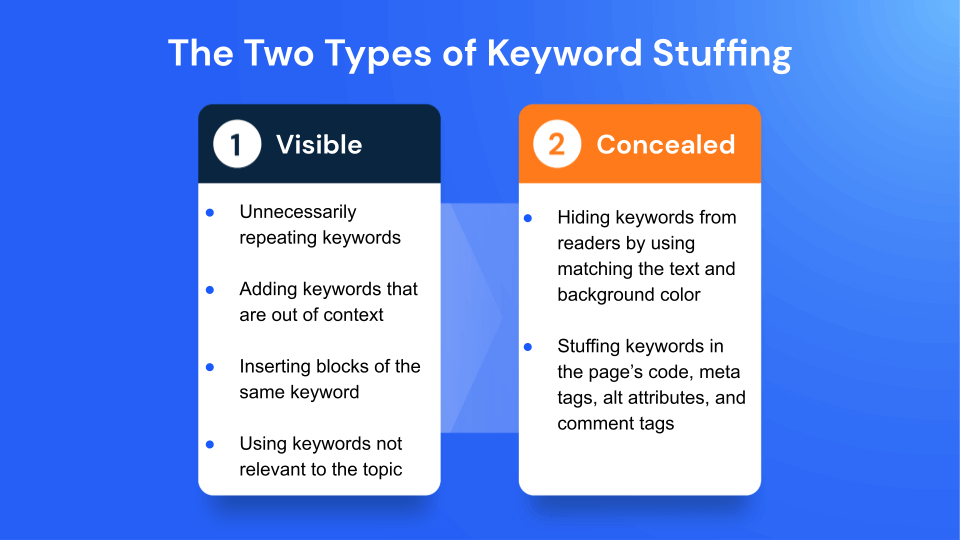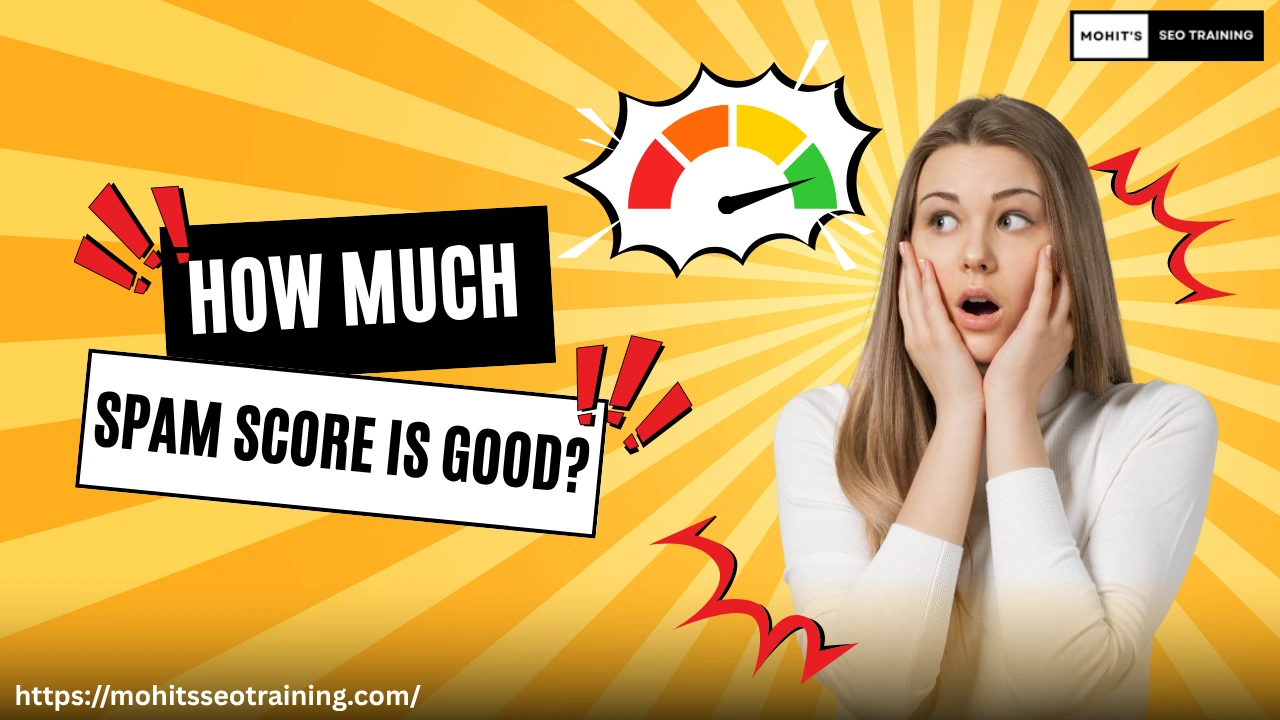The Process of using keywords un-naturally in the content i.e. in the headers, and in the content just to show that your content is relevant, and worth is read is called Keyword stuffing.
People do it just to rank faster for a set of keywords by using them forcefully in the content.
Also Read: Keyword Stuffing in Digital Marketing

Example of Keyword Stuffing in SEO

An example of keyword stuffing in SEO might look something like this:
- “If you want to improve your website’s ranking, you need to focus on SEO. SEO is the key to getting your website to rank on search engines. Good SEO practices lead to SEO success.”
In this example, the term SEO is repeated far too often, making the sentence awkward and difficult to read. This is a clear case of keyword stuffing in SEO that will likely be penalized by search engines for being manipulative.
Also Read: How Keyword Research is Done?
Why Keyword Stuffing in Digital Marketing Is Harmful?
1. Poor User Experience
One of the primary reasons keyword stuffing in digital marketing is harmful is because it degrades the user experience. Content stuffed with keywords often feels robotic and forced, making it hard for readers to engage with the material. A website that prioritizes keywords over quality will likely see a high bounce rate, as users quickly leave the page in search of more valuable and readable content.
2. Search Engine Penalties
Search engines like Google use complex algorithms to evaluate the quality of content. When a website engages in keyword stuffing in SEO, search engines can detect this and impose penalties. This could result in a decrease in search rankings, and in some cases, a site may be removed from search engine results altogether. The Penguin update from Google, for example, specifically targets sites that use manipulative practices like keyword stuffing.
3. Missed Opportunities for High-Quality Content
By focusing too much on keyword density, marketers miss out on the opportunity to create valuable, informative content that truly addresses the needs of their audience. Content that answers user queries in a comprehensive, well-written manner is far more likely to rank highly in search results than content that simply repeats a keyword in an unnatural manner.
4. Negative Impact on Credibility
If a website is caught engaging in keyword stuffing in digital marketing, it can damage the site’s credibility. Both users and search engines may view the content as spam, reducing trust in the website. This can harm the reputation of the business and hinder long-term growth and success.
How Search Engines Detect Keyword Stuffing?
Modern search engines are far more intelligent than they were in the past. They use advanced algorithms to detect and penalize sites that engage in keyword stuffing in SEO. These algorithms take various factors into account, including:
- Keyword Frequency: If a keyword appears far too many times in a small block of text, search engines will recognize it as keyword stuffing.
- Contextual Relevance: Keywords must be placed in a way that makes sense in the context of the content. If they appear artificially, it’s a red flag to search engines.
- User Engagement: Search engines look at metrics such as bounce rate and time on page. If users quickly leave a page due to poor readability caused by keyword stuffing in digital marketing, it’s a signal that the content isn’t providing value.
Also Read: What is a Good Keyword Density?
Best Practices for Avoiding Keyword Stuffing in Digital Marketing
Rather than relying on keyword stuffing in digital marketing as a shortcut to improving your SEO, it’s essential to use ethical and effective SEO strategies. Here are some best practices for avoiding keyword stuffing in SEO:
1. Focus on Creating High-Quality, Informative Content
Instead of worrying about how many times you can use a keyword, focus on writing content that answers the user’s question or provides valuable information. High-quality content that satisfies user intent is far more likely to rank well than content that is overstuffed with keywords. Search engines reward content that is relevant, engaging, and well-structured.
2. Use Keywords Naturally
Integrate your keywords in a natural and conversational way. Your content should flow smoothly, without feeling forced. For example, instead of repeating the phrase “digital marketing” every few sentences, try to vary your language and use synonyms, related terms, or even long-tail keywords.
- Bad Example: “Digital marketing is important for digital marketing growth. Digital marketing helps businesses to expand their digital marketing efforts.”
- Good Example: “Digital marketing plays a critical role in business growth, helping companies reach their target audience through various online channels.”
3. Use Synonyms and Related Keywords
Rather than using the exact same keyword repeatedly, incorporate synonyms and related terms into your content. This not only helps you avoid keyword stuffing in SEO, but it also enriches the content and makes it more relevant for a broader range of search queries.
For example, instead of always using “digital marketing,” try using variations like “online marketing,” “internet marketing,” or “digital advertising.” This will help diversify your content and make it more readable.
4. Optimize Other SEO Elements
While keywords are important, on-page SEO includes several other elements that can help improve your rankings. Make sure to:
- Optimize title tags and meta descriptions by including your target keyword without overstuffing.
- Use header tags (H1, H2, H3) to structure your content and make it easier for both search engines and readers to navigate.
- Add relevant internal and external links to enhance the quality of your content.
5. Monitor Keyword Density
There is no perfect keyword density formula, but a good rule of thumb is to aim for around 1-2% keyword usage in your content. Tools like Yoast SEO and Google’s Keyword Planner can help you track keyword density and ensure you’re not overdoing it.
What Is an Example of Keyword Stuffing in SEO?

To further clarify the concept of keyword stuffing in SEO, let’s look at an example.
Bad Example:
“Keyword stuffing is bad for SEO. Many SEO experts agree that keyword stuffing can harm your SEO efforts. Avoid keyword stuffing at all costs to improve SEO.”
This sentence repeats “keyword stuffing” and “SEO” unnecessarily. It feels unnatural and awkward to read. This is a clear case of keyword stuffing in SEO.
Good Example:
“Keyword stuffing in SEO can have negative consequences for your website’s ranking. Instead of focusing solely on keyword density, it’s better to create high-quality content that provides value to users.”
This version uses the keywords in a more natural way, without overuse.
In conclusion, keyword stuffing in digital marketing is a practice that can do more harm than good. While it may have worked in the past, search engines today have advanced algorithms that can easily detect and penalize keyword stuffing. Instead of relying on this outdated tactic, focus on creating valuable content that naturally incorporates keywords in a way that enhances the user experience. By doing so, you’ll improve your rankings and build long-term success in the world of SEO.
How Mohit’s SEO Training Can Help?
At Mohit’s SEO Training, we offer a hands-on, results-driven SEO course designed to make you job-ready. Rather than focusing purely on theory, our training emphasizes practical, real-world applications of SEO. In addition to our Advanced SEO Training in Bangalore, we also provide expert Organic SEO Consulting. Whether you’re seeking a proven SEO strategy to boost your business or need specialized SEO services, we’re here to help. Our offerings include Local SEO, SaaS SEO, Ecommerce SEO, and International SEO, tailored for businesses both in India and internationally. Let us partner with you to elevate your online presence and drive your business to success.
Other Related Blogs
Keyword Cannibalization in SEO
Meaning of Keyword Difficulty Score
What is Good Keyword density?
Keyword proximity in SEO
Keyword stuffing in Digital Marketing
Tools used for keyword research
How to do the keyword research?
Keyword prominence in SEO
Importance of keyword research
FAQs
What is keyword stuffing in digital marketing?
Keyword stuffing in digital marketing is the excessive and unnatural use of keywords in an attempt to manipulate search engine rankings.
Why is keyword stuffing harmful for SEO?
Keyword stuffing can lead to search engine penalties, reduced user engagement, and poor content quality, all of which harm your website’s SEO performance.
How can I avoid keyword stuffing in my content?
To avoid keyword stuffing in SEO, focus on creating high-quality content that naturally integrates keywords. Use synonyms, related terms, and keep the content readable.
What is an example of keyword stuffing?
An example of keyword stuffing in SEO is repeating the same keyword unnecessarily, like: “Keyword stuffing in SEO is harmful. Keyword stuffing in SEO can hurt your SEO efforts.”
Mohit Verma
I am an experienced professional with 9+ years of experience in Search Engine Optimization. I am on a mission to provide industry focused job oriented SEO so the students/mentees can get their dream SEO job and and start working from day 1.




